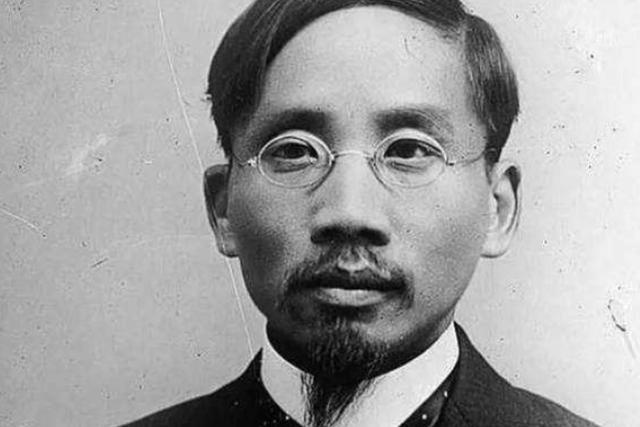Text/Kingdom Building
Mr. Cai Yuanpei is a well-known educator, revolutionary and politician in modern Chinese history, and has served as the president of Peking University, a member of the Executive Committee of the Kuomintang Central Committee, the director of education, and the director of supervision. However, compared with these prominent positions, Mr. Cai Yuanpei's other two identities are more legendary and mysterious, that is, the editor of the Hanlin Academy of the Manchu Qing Court and the first president of the Guangfu Society, whose main revolutionary purpose was assassination.
Cai Yuanpei was born in 1868 in Shanyin, Zhejiang (present-day Shaoxing, Zhejiang). At the age of 17, he was admitted as a talent, at the age of 18, he opened the library to teach apprentices, at the age of 22, he was the thirty-fourth jinshi of the second class at the age of 25, and at the age of 27, he was awarded the editing of Hanlin Academy. It is reasonable to say that Cai Yuanpei is young and promising, has a smooth career, is a standard successful person, and whoever rebels will not be able to rebel. But the fact is that Cai Yuanpei went from being a Manchu Qing Hanlin editor to becoming the leader of the Guangfu Society who used the assassination of Manchu Qing politicians as a revolutionary means, and the merits of this are unbelievable.

How did Mr. Cai Yuanpei go from being a young talent in the Manchu Qing Dynasty to a rebel revolutionary? In 1894, after the outbreak of the Sino-Japanese War and the defeat of China, it signed the humiliating "Maguan Treaty" with Japan and cut off the land to pay compensation. Although Cai Yuanpei, who was then the editor of the Hanlin Academy, had no say in the imperial court, he strongly opposed the signing of the "Maguan Treaty" and deeply understood the corruption and incompetence of the Manchu Qing Dynasty, so he began to contact and learn Western science and political and cultural ideas, and gradually transformed from a feudal official into a revolutionary with modern political and cultural ideas.
In November 1903, Wang Jiawei, Jiang Zungui, Tao Chengzhang, Wei Lan, Gong Baoquan and other revolutionary volunteers discussed the establishment of the GuangfuHui in Tokyo, Japan. Later, Wei Lan and Tao Chengzhang returned to Shanghai to consult with Cai Yuanpei, and finally settled the matter of the establishment of the GuangfuHui. In order to be cautious, Cai Yuanpei, who is quite famous and socially established, was elected as the first president of the Guangfu Association, and Tao Chengzhang was appointed as the vice president. Soon, the Guangfuhui absorbed hundreds of capable people such as Xu Xilin, Qiu Jin, and Zhang Taiyan, and its influence spread throughout Jiangsu, Zhejiang, and Southeast Asia, becoming a revolutionary contingent with great influence.
In 1905, the Plenary Session of the Guangfu Society was merged into the Chinese League, and Cai Yuanpei was appointed by Sun Yat-sen as the head of the Shanghai branch of the League. Nevertheless, most of the members of the Restoration Society carried out revolutionary activities independently of the League. Because the revolutionary means were mostly inclined to assassinate and assassinate political leaders of the Manchu Qing Dynasty, the Guangfuhui became the most hated and feared revolutionary group in the League. Its leader Tao Chengzhang famously said: Revolution is rebellion, change of dynasty!
In May 1907, due to differences with comrades of the Guangfuhui, Cai Yuanpei, with the help of Sun Baoqi, minister of the Manchu Qing government to Germany, went to the University of Leipzig in Germany to study for four years. At this time, the actual leaders of the Guangfuhui were Tao Chengzhang, Xu Xilin, Zhang Taiyan and others.
After the victory of the Xinhai Revolution in 1911, Cai Yuanpei was invited by Chen Qimei, the governor of Shanghai, to return home from Europe. He served as the first Director general of education in the Provisional Government of Nanjing. Later, after Yuan Shikai came to power, because of his political disagreement with Yuan Shikai, he resigned and went to France to study, and together with Li Shizeng, Wu Yuzhang, and others, initiated the organization of the Huafa Education Association, and advocated work-study in France, which cultivated a large number of outstanding talents such as Zhou Enlai and Deng Xiaoping for our party.
In 1916, Cai Yuanpei, who had just returned from Europe, was appointed president of Peking University by the Beiyang government. During this period, in order to help Hu Shi enter Peking University to teach, he forged his academic qualifications and forged Hu Shi's academic qualifications, which had not yet obtained a doctorate, to a doctorate at Columbia University.
In 1924, after sun yat-sen's nomination, Cai Yuanpei was elected as an alternate member of the Central Control Commission of the Nationalist Government. From 1927 onwards, he successively served as minister of justice and chief inspector of the National Government in Nanjing.
In 1932, he resigned from the government and became the president of the Academia Sinica. During this period, he founded the Central Museum and served as the chairman of the first council.
After the outbreak of the War of Resistance Against Japanese Aggression in 1937, it organized the Shanghai Cultural Circles Salvation Association and actively organized and mobilized people from cultural circles and the public to participate in the Anti-Japanese National Salvation Movement.
On March 5, 1940, Cai Yuanpei died of illness in Hong Kong at the age of 73. The body was buried at the Peak Chinese Cemetery in Aberdeen, Hong Kong.